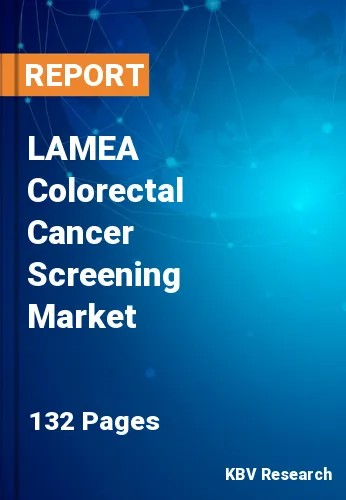The Latin America, Middle East and Africa Colorectal Cancer Screening Market would witness market growth of 8.6% CAGR during the forecast period (2023-2030).
Improvements in genomics and molecular diagnostics have transformed the detection, diagnosis, and treatment of colorectal cancer. Genetic testing can assist in identifying high-risk individuals and guiding treatment decisions based on gene mutations. Non-invasive screening techniques, including liquid biopsy, provide less invasive and more easier screening options, increasing patient participation and promoting early detection.
Advancements in medical imaging and diagnostic technologies have improved the accuracy and effectiveness of colorectal cancer screening methods, encouraging more individuals to undergo screening. The development of newer and more accurate screening methods, such as non-invasive tests like fecal immunochemical tests (FIT) and blood-based tests, has made screening more convenient and accessible to a broader population.
Due to factors including increasing colorectal cancer incidence and more patient awareness in developing nations, there is an increase in demand. The current gold standard for diagnosing and screening colorectal cancer is colonoscopies. In addition, non-invasive tests have increased screening rates due to their cost-effectiveness, accessibility, and patient preferences. This pattern is anticipated to persist throughout the forecast period, fueling the demand.
Colorectal cancer rates in Latin America are influenced by a combination of factors, including changes in lifestyle, diet, aging populations, urbanization, and limited access to healthcare. As countries in Latin America experience urbanization and economic development, there is a shift towards more sedentary lifestyles and diets rich in processed foods, red meat, and sugary beverages. The region’s well established healthcare sector and the rising cancer cases are anticipated to contribute to the growth of regional market.
The Brazil market dominated the LAMEA Colorectal Cancer Screening Market by Country in 2022, and would continue to be a dominant market till 2030; thereby, achieving a market value of $317.3 million by 2030. The Argentina market is estimated to grow at a CAGR of 9.1% during (2023 - 2030). Additionally, The UAE market would exhibit a CAGR of 8.3% during (2023 - 2030).
Based on Type, the market is segmented into Colonoscopy, Stool-based (Fecal Immunochemical Test (FIT), Fecal Occult Blood Test (FOBT), and Stool-DNA Test), and Others. Based on End-user, the market is segmented into Government, Energy, Defense, Agriculture & Forestry, Media & Entertainment, Civil Engineering & Archaeology, and Others. Based on countries, the market is segmented into Brazil, Argentina, UAE, Saudi Arabia, South Africa, Nigeria, and Rest of LAMEA.
Free Valuable Insights: The Worldwide Colorectal Cancer Screening Market is Projected to reach USD 22.2 Billion by 2030, at a CAGR of 4.8%
The market research report covers the analysis of key stake holders of the market. Key companies profiled in the report include Novigenix SA, Eiken Chemical Co., Ltd., Clinical Genomics Pathology, Inc., Exact Sciences Corporation, Epigenomics AG, BioMerieux S.A., Olympus Corporation, Sysmex Corporation, Fujifilm Holdings Corporation, and Siemens Healthineers AG (Siemens AG).
By Type
By End-user
By Country
Our team of dedicated experts can provide you with attractive expansion opportunities for your business.

